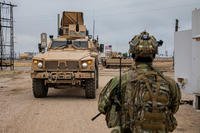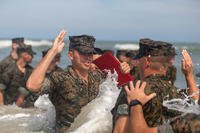This month, DOD is observing the 12th annual Sexual Assault Awareness and Prevention month with the theme "Prevention is Possible."
Though the Sexual Assault Prevention and Response Program is a year round effort, commands will be using the month of April to reinforce methods of reducing sexual assault within the services. Special training programs will also remind servicemembers of ways to report abuse, and the severe criminal charges and penalties that offenders may face.
In fiscal year 2014 the estimated percentage of active duty members experiencing any type of sexual assault was 1.54 percent for all the services, an increase of 11% from the previous year.
Military Sexual Assault Information
Currently, DOD has two methods that victims of sexual assault may use to report it:
- Restricted Reporting: The victim can access healthcare, advocacy services, and legal services without the notification to command or law enforcement.
- Unrestricted Reporting: Both the command and law enforcement are notified. Unrestricted reporting must be done via the chain of command.
While in the past victims of sexual assault in the military were often faced with the dilemma of reporting the assault via the chain of command, studies show that three out of four servicemembers don’t trust the system enough to report their assaults, and one in seven military sexual assault survivors said their perpetrator was someone in their chain of command. Realizing this fact DOD has eased the reporting requirement for Unrestricted Reporting in recent years, allowing victims to report sexual assault to:
- medical personnel
- ANY member of their chain-of-command (not just direct reports)
- law enforcement or legal personnel
- chaplains
- the command's Sexual Assault Prevention and Response Office or Sexual Assault Response Coordinator.
The DOD has also set up a website for Restricted Reporting: https://www.safehelpline.org/ which gives victims support, counseling, and assistance from legal personnel and medical professionals. The site also has a mobile app, contacts for telephone assistance, service-specific resources, live chat functions (as well as text messaging), and VA resources.
VA Sexual Assault Resources
The VA uses the term "military sexual trauma" or "MST" to refer to sexual assault or sexual harassment during military service and has services available to assist Veterans in their recovery from MST.
Every VA facility has a designated MST Coordinator who serves as a contact person for MST-related issues. This person is a patient advocate and can help find and access VA services and programs, state and federal benefits, and community resources. Call 800-827-1000 for more information.
Veterans can receive free treatment for mental and physical health conditions related to their experiences of MST at every VA medical facility. Veterans do not need to have documentation of their experiences and may be able to receive care even if they are not eligible for other VA services.
Veterans can apply for disability compensation for any current difficulties that are related to their service, including difficulties related to MST.










